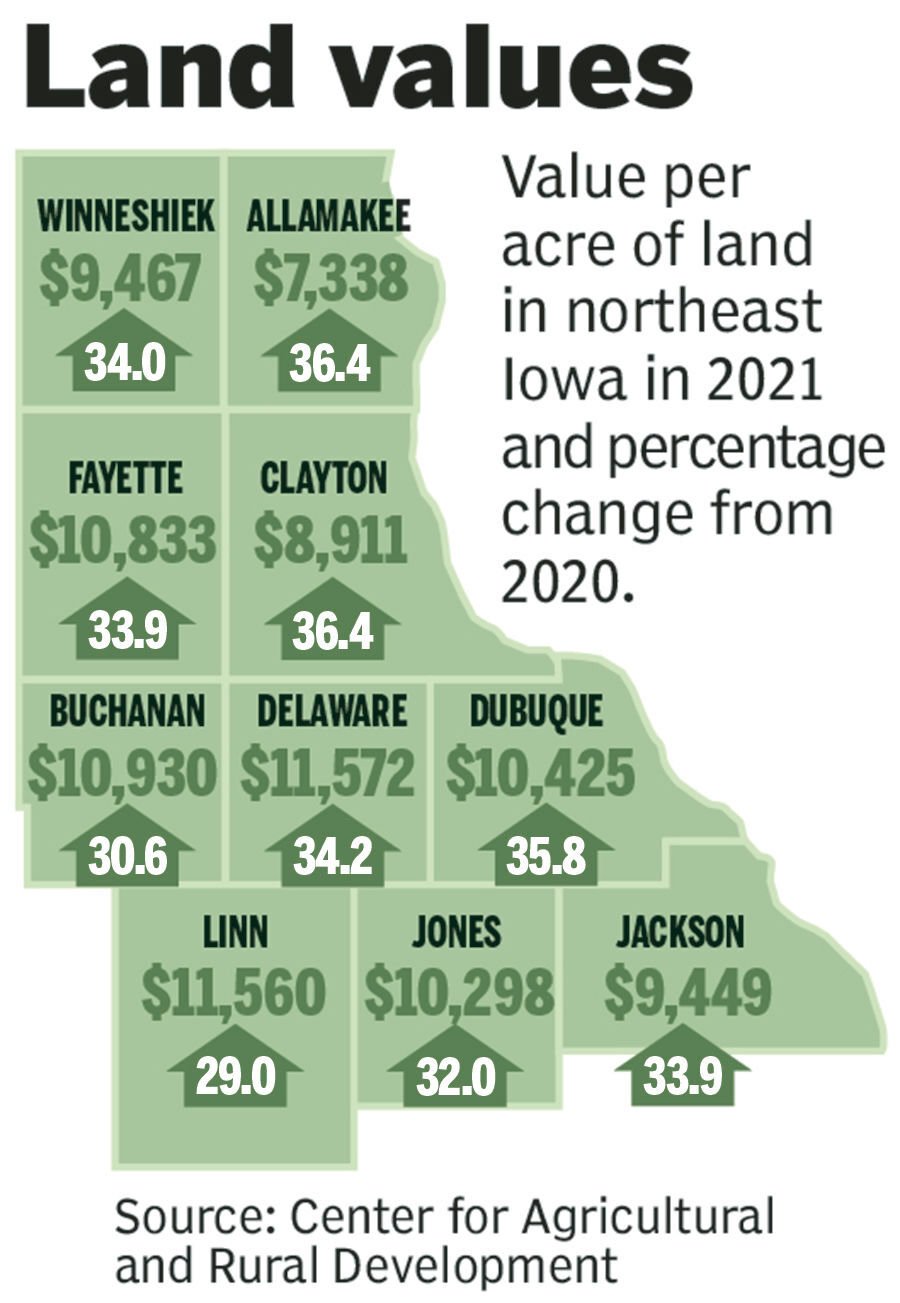The average price for an acre of Iowa farmland increased by 29% in 2021, and the rate of growth was even higher for Dubuque County and its neighbors.
The annual Iowa Land Value Survey, the results of which were released Tuesday, showed that the average price per acre is now $9,751, up from $7,559 one year ago.
“This is very, very significant,” said Wendong Zhang, an associate professor of economics at Iowa State University’s Center for Agricultural and Rural Development, during a press conference. “The last time we saw land values increase close to or higher than 30% was in 2011. Before that, we have to go back to the 1970s.”
Local counties observed an even higher pace of growth.
The average value for an acre of Dubuque County farmland jumped by 35.8% over the past year and now sits at $10,425. In Jackson County, the average acre is $9,449, an increase of 33.9%; in Delaware County, the value rose 34.2% to 11,572; in Jones County, it rose 32% to $10,298; and in Clayton County, it increased 36.4% to $8,991.
Zhang said there are multiple factors influencing this growth, including high commodity prices and favorable interest rates. High demand for farmland, and the limited availability of it, also has put upward pressure on these values.
The current value for an acre of farmland is now higher than it has ever been before. Adjusting for inflation, however, the price of farmland in 2021 remains below prices from 2012 and 2013, Zhang explained.
The figures were a bit jarring to Craig Recker, a farmer in New Vienna.
“I knew (the value) was going to go up, but to go up that much surprised me,” he said.
Recker believes there are multiple factors influencing the rising costs of land, including the scarcity of available parcels.
He said, to the best of his knowledge, it has been at least three years since farmland went on the market within a 10-mile radius of his farm.
When a piece of land does come on the market, farmers aren’t the only ones looking at it. Recker noted that people from outside the ag industry are taking a keen interest in buying land, viewing it as a shrewd investment.
The ballooning land costs have priced many aspiring farmers out of the market.
“If you are 20 or 25 years old and you want to farm, you better know someone,” Recker said. “You can’t just go to a bank and say, ‘I want to borrow $3 million, and I want to buy a farm.’ You will get laughed out of the place.”
East Iowa Real Estate, of Maquoketa, announced online earlier this month that a 75-acre parcel in Jackson County sold for $19,900 per acre.
“Farmland has been and will always be a good investment,” states an online post from the company in relation to a story about the sale.
The cost increases observed in 2021 continue a trend that has been ongoing for decades in Iowa.
Back in 1991, the average value was $1,219. Twenty years ago, the average cost for an acre of farmland in Iowa was $1,926. The cost today is more than five times higher.
While predicting the future trajectory of land prices is easier said than done, Recker believes farmland prices might have peaked this year.
“If interest rates start to get up and commodity prices start to fall, I think that will make a big difference,” he explained.
Zhang said some types of land are fetching more money than others.
“High quality land is up 30.5%, medium quality 27% and low quality 26%,” he said. “We do see there has been slightly stronger growth for higher quality ground … and there has been more competitive bidding for these properties.”



